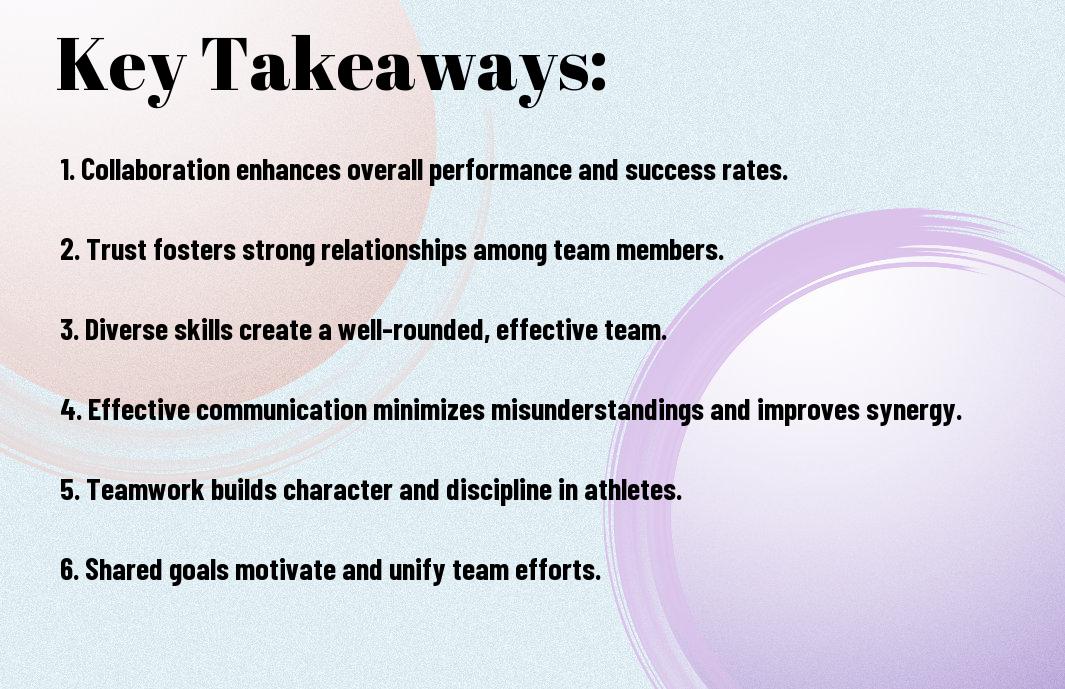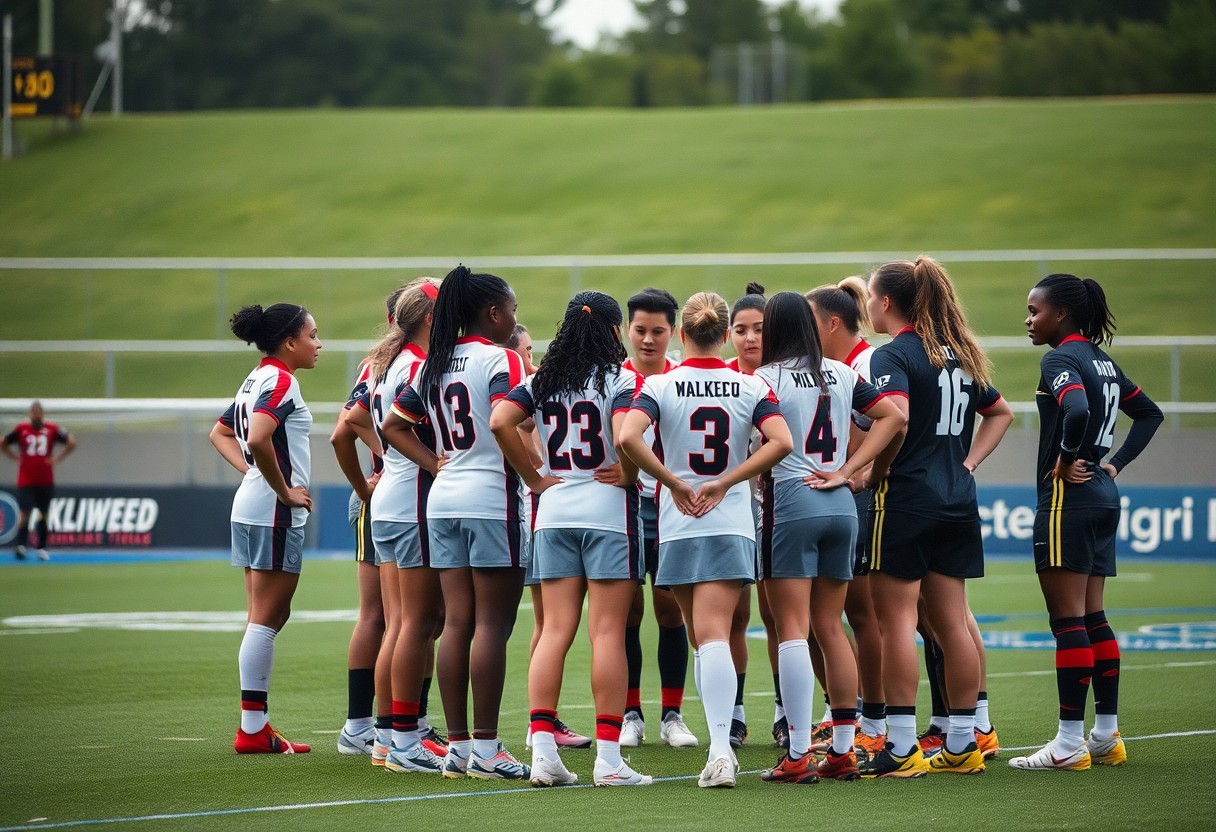Teamwork lies at the heart of every successful sporting endeavor. When you engage in sports, your ability to collaborate with teammates significantly influences your performance and overall experience. Understanding the dynamics of teamwork enables you to harness individual strengths, foster communication, and build trust within the group. Developing these relationships not only enhances your skills but also cultivates a sense of camaraderie that can drive your team to victory. In this post, we will explore the vital role teamwork plays in sports and how it can be a game-changer for you and your teammates.
Key Takeaways:
- Collaboration is vital for success: Teamwork fosters a sense of unity and enables athletes to work collectively towards achieving common goals.
- Communication enhances performance: Effective communication among team members helps in making quick decisions and executing strategies efficiently.
- Support builds confidence: A strong team provides emotional and motivational support, which can boost individual performance and overall morale.
- Diverse skills improve outcomes: Each team member brings unique abilities, creating a more versatile and adaptive unit that can overcome challenges more effectively.
- Leadership fosters growth: Strong leaders within a team can inspire and cultivate talent, guiding teammates to reach their full potential.
The Role of Communication in Teamwork
While you may excel as an individual athlete, the strength of your team largely depends on effective communication. Clear and open communication fosters understanding among team members, ensuring everyone shares the same goals and strategies. This dynamic not only enhances performance on the field but also cultivates a supportive environment where each player feels valued and included.
Verbal and Non-Verbal Communication
Around every successful team, there lies a foundation of both verbal and non-verbal communication. Verbal exchanges during practice and games provide clarity and direction, while non-verbal cues, like body language and facial expressions, can convey emotions and intentions that words often cannot. Being mindful of both forms of communication allows you to connect more deeply with your teammates.
Building Trust through Open Dialogue
Teamwork thrives on trust, and open dialogue is the key to building that trust. When you encourage honest conversations, you foster an environment where every member feels comfortable expressing their thoughts and feelings. This mutual respect paves the way for collaboration and understanding, making it easier to address conflicts and devise strategic plans that benefit the entire team.
Verbal communication plays a vital role in establishing trust among teammates. By actively engaging in open dialogue, you demonstrate your commitment to listening and valuing others’ opinions. This emotional investment encourages your teammates to reciprocate, creating a cycle of trust and camaraderie. As trust deepens, your team can tackle challenges more effectively, allowing for not just individual growth but collective success.

Collaboration and Shared Goals
Clearly, successful teamwork in sports hinges on effective collaboration and a unified purpose. When individuals come together, their separate skills and talents can merge to attain shared goals, enhancing not just individual performance but the team’s overall success. A collective commitment fosters camaraderie, enhances trust, and leads to better communication, ultimately providing a strong foundation for a successful sporting experience.
Establishing Common Objectives
Below, you’ll find that setting clear and common objectives is vital for aligning team members. When everyone understands the goals, whether winning a championship or improving personal skills, it creates a sense of purpose. Establishing these objectives can lead to more effective training sessions and focused teamwork, making each member feel accountable and motivated to contribute their best efforts.
Supporting Each Other’s Strengths
Establishing an environment where team members support each other’s strengths fosters unity and enhances performance. When you recognize and leverage the unique skills of your teammates, it creates a balanced dynamic that allows the team to function more effectively. This not only builds trust but also encourages players to challenge one another, facilitating growth and improvement.
Consequently, when your teammates’ strengths are actively acknowledged and utilized, everyone benefits. You create an environment where individuals feel valued and empowered to perform at their best. By highlighting each person’s unique abilities, the team can work in harmony, making strategic advantages clear and building a strong, collaborative spirit that ultimately leads to greater success both on and off the field.
The Impact of Teamwork on Performance
To excel in sports, teamwork plays a significant role in enhancing overall performance. When individuals come together, they combine their strengths, share responsibilities, and create a unified strategy. This collaboration allows for improved communication, coordination, and trust among team members, directly influencing game outcomes. As a result, you are likely to see increased efficiency and effectiveness during practice and competition, ultimately paving the way for success on the field.
Enhanced Problem-Solving Skills
Teamwork cultivates enhanced problem-solving skills among players. By collaborating, you engage in brainstorming and creative thinking, allowing your team to devise innovative strategies to tackle challenges. Multiple perspectives lead to a richer understanding of problems, making it easier for your team to find effective solutions under pressure during games.
Increased Motivation and Morale
Teamwork fosters increased motivation and morale within the group. When you work alongside teammates, you share victories and setbacks, creating a supportive environment that drives you to excel. As motivation builds collectively, your commitment to the team strengthens, leading to improved performance both individually and collectively.
For instance, when you face a challenging game, the encouragement from your teammates can uplift your spirits and push you to perform at your best. This shared motivation not only enhances your determination but also creates a sense of shared purpose, reminding you that you are part of something greater. Celebrating achievements together nurtures a positive team culture, further fueling your drive to succeed as a cohesive unit.
Leadership and Team Dynamics
After recognizing the role of effective leadership, it becomes clear that strong leaders can significantly enhance team dynamics. They set the tone, communicate expectations, and motivate team members to perform at their best. A skilled leader understands each player’s strengths and weaknesses, fostering collaboration and trust, which ultimately drives team success.
The Importance of Strong Leadership
Between a team’s performance and its leader’s vision lies a powerful connection. A strong leader not only guides the team but also cultivates an environment where every member feels valued and understood. By providing clear direction and support, you can inspire consistency and accountability, empowering your team to reach collective goals.
Fostering Positive Team Relationships
On a successful team, positive relationships are crucial. These connections improve communication, enhance trust, and create an atmosphere where collaboration flourishes. As you build partnerships among teammates, you will witness an increase in morale and unwavering support, both on and off the field.
To foster positive team relationships, prioritize open communication and actively encourage team-building activities. Invest time in getting to know each other, both personally and professionally. Participate in group discussions and create opportunities for teammates to share their thoughts and experiences. By actively engaging in team dynamics, you will strengthen bonds that enhance not only performance but also the overall enjoyment of the sport.
Overcoming Challenges as a Team
Many sports teams face various challenges that can either strengthen or weaken their bond. When these obstacles arise, it’s necessary to unite and tackle them collectively. By pooling your skills and perspectives, you can develop innovative solutions and build resilience. Embracing these challenges as a team can elevate your performance and foster a sense of shared achievement, proving that collaboration is vital in overcoming adversity.
Handling Conflict Constructively
After a disagreement arises within your team, it’s important to approach the situation with an open mindset. Constructive conflict resolution involves listening to different viewpoints, discussing feelings honestly, and finding common ground. By doing so, you can transform tension into an opportunity for growth, strengthening relationships and improving overall team dynamics.
Learning from Failures Together
For every athlete, failure is an inevitable part of the journey. Instead of dwelling on setbacks, you should view them as valuable learning experiences. As a team, reflecting on what went wrong can help you identify areas for improvement. Discussing these lessons openly fosters a culture of accountability, allowing you to adjust strategies and come back stronger in future competitions.
Handling failures together not only strengthens your collective resolve but also reinforces a sense of camaraderie. By sharing the burden of disappointment, each team member contributes to a supportive environment where growth is prioritized. This process encourages transparency and trust, paving the way for future successes. Embracing mistakes as learning moments ultimately cultivates resilience, uniting your team along the path to improvement.

Case Studies: Successful Teams in Sports
Once again, examining successful teams can provide vital insights into the importance of teamwork. Some notable case studies include:
- 2016 Chicago Cubs – Ended a 108-year championship drought with a cohesive team culture and strong communication.
- 1995 New Zealand Rugby World Cup – Achieved victory through continuous support and trust among teammates.
- 2014 German National Football Team – Won the World Cup with unparalleled synergy and collective effort.
- 2018 Golden State Warriors – Dominated the NBA using selfless play and a commitment to team goals.
Examining Winning Teams
Along your journey through sports, you can learn from the dynamics of winning teams. Their ability to collaborate effectively often leads to outstanding achievements, showcasing how overcoming individual differences paves the way for victory.
Lessons Learned from Team Failures
Across various sports, failures often reveal the weaknesses in teamwork. Analyzing these shortcomings can help you understand what went wrong and how to improve future performances.
From these failures, you can gain invaluable lessons about the necessity of clear communication, shared objectives, and trust among teammates. High-profile failures, like the 2004 U.S. Men’s Olympic Basketball team’s unexpected loss, illustrate how reliance on star players without a strong framework can lead to misalignment. By reflecting on these experiences, you can take actionable steps to strengthen your team dynamics in the future.
Final Words
From above, you can see that teamwork in sports is fundamental for achieving success and fostering personal growth. When you collaborate effectively with teammates, you not only enhance your skills but also develop crucial traits like communication, trust, and resilience. By embracing the collective effort of your team, you create a supportive environment that motivates everyone to push beyond their limits. Ultimately, your experience in sports will be enriched, and the bonds you form will last well beyond the game.
Q: Why is teamwork necessary in sports?
A: Teamwork is necessary in sports because it fosters collaboration among players, promoting a sense of unity and shared goals. When athletes work together, they can combine their individual strengths, which often leads to better performance and outcomes on the field. It also helps in building trust and camaraderie, which are vital for maintaining morale and motivation throughout the season.
Q: How does effective communication impact teamwork in sports?
A: Effective communication is key to enhancing teamwork in sports. Athletes need to convey strategies, adjust plays, and support one another during competitions. Open lines of communication allow players to express concerns, share ideas, and provide feedback. This not only helps in making quick decisions during games but also builds a strong team culture where everyone feels valued and understood.
Q: What role does leadership play in facilitating teamwork?
A: Leadership plays a significant role in facilitating teamwork by guiding and inspiring team members toward a common purpose. Strong leaders set the tone for collaboration, establish team norms, and encourage participation from all players. They help to resolve conflicts and maintain focus, ensuring that each athlete understands their role within the team. By fostering an environment where everyone feels accountable and motivated, leaders can enhance the overall effectiveness of teamwork in sports.

